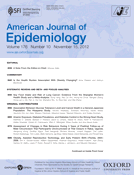
AMERICAN JOURNAL OF EPIDEMIOLOGY
Scope & Guideline
Innovating Methodologies, Transforming Outcomes
Introduction
Aims and Scopes
- Epidemiological Research:
The journal publishes original research that explores the distribution and determinants of health-related states or events in specified populations, utilizing observational, experimental, and longitudinal studies. - Public Health Implications:
Research articles often assess public health interventions and policies, aiming to provide evidence that can guide decision-making and resource allocation in health systems. - Methodological Innovations:
The journal places a strong emphasis on the development and application of innovative epidemiological methods, including statistical modeling, causal inference, and machine learning techniques. - Health Disparities and Social Determinants:
A significant focus is placed on understanding how social factors, such as race, socioeconomic status, and environment, impact health outcomes and contribute to health disparities. - Global Health Perspectives:
The journal includes studies that address health issues on a global scale, reflecting the interconnectedness of health determinants across different populations.
Trending and Emerging
- Causal Inference Methods:
There is a growing emphasis on causal inference methods, including targeted maximum likelihood estimation and Bayesian approaches, reflecting a shift towards understanding the causal pathways of health outcomes. - Mental Health Epidemiology:
Research related to mental health has surged, particularly in the context of the COVID-19 pandemic, highlighting the importance of mental health as a critical component of overall health. - Health Disparities and Equity Research:
There is an increasing focus on studies addressing health disparities and equity, particularly regarding the impact of social determinants on health outcomes across different populations. - Environmental Epidemiology:
Research examining the effects of environmental exposures, such as air pollution and climate change, on health outcomes has gained traction, reflecting growing public concern over environmental health. - Digital Epidemiology and Data Science:
The integration of digital health data and advanced data science techniques, including machine learning, is becoming more prevalent, enabling the analysis of large datasets for epidemiological research.
Declining or Waning
- Traditional Case-Control Studies:
There has been a noticeable decline in the publication of traditional case-control studies, likely due to the increasing preference for more complex modeling approaches and longitudinal designs that provide richer data. - Focus on Infectious Disease Alone:
Although infectious diseases remain a critical area of research, the journal's recent publications indicate a waning focus on this area, as broader health issues, including chronic diseases and mental health, gain prominence. - Single-Cause Analyses:
The journal appears to be moving away from studies that focus on single causes of disease, favoring more comprehensive approaches that consider multiple risk factors and interactions.
Similar Journals
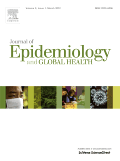
Journal of Epidemiology and Global Health
Unlocking the potential of open-access research for a healthier world.The Journal of Epidemiology and Global Health (ISSN: 2210-6006; E-ISSN: 2210-6014), published by SpringerNature, stands as a premier open-access platform in the field of epidemiology, dedicated to advancing our understanding of global health challenges since 2011. Based in Switzerland, this journal is recognized for its significant contributions to the discipline, achieving an impressive Q1 ranking in Epidemiology and positioning itself at the 88th percentile within the Scopus Medicine - Epidemiology category. With a goal to disseminate innovative research and foster dialogue among scholars, public health professionals, and students, the journal provides a rich repository of empirical studies, reviews, and theoretical contributions that address pressing epidemiological issues. Its commitment to open access ensures that vital research is freely available to the global community, thereby amplifying its impact and relevance. Researchers seeking to publish and access high-quality, peer-reviewed articles will find the Journal of Epidemiology and Global Health an invaluable resource in navigating the ever-evolving landscape of public health.

EUROPEAN JOURNAL OF EPIDEMIOLOGY
Uncovering the science behind population health dynamics.The European Journal of Epidemiology is a premier peer-reviewed journal published by Springer, specializing in the vast and critical field of epidemiology. With its ISSN 0393-2990 and E-ISSN 1573-7284, this journal has been a leading platform for disseminating high-quality research since its inception in 1985, encompassing a comprehensive range of topics pertinent to public health and epidemiological science. Proudly based in the Netherlands, the journal has secured a prestigious Q1 ranking in the field of Epidemiology and boasts an impressive Scopus rank of #8 out of 148 in its category, placing it in the 94th percentile among its peers. With a commitment to advancing knowledge and practice in epidemiology, the journal provides invaluable insights for researchers, healthcare professionals, and students, facilitating a better understanding of disease distribution and determinants in populations. While it operates under a subscription model, the European Journal of Epidemiology continues to uphold its reputation as an essential resource for innovative research and public health advancements through the years.
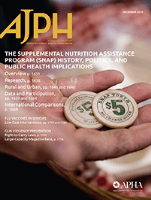
AMERICAN JOURNAL OF PUBLIC HEALTH
Innovating solutions for community health challenges.The American Journal of Public Health, published by the American Public Health Association, stands as a cornerstone in the field of public health and epidemiology since its inception in 1949. With its rigorous peer-review process and a robust commitment to advancing knowledge and research practices, this journal holds a prestigious position in the academic community, as reflected in its 2023 Scopus ranking, where it is placed in the top percentile (93rd) within the categories of Public Health and Environmental and Occupational Health. The journal's focus encompasses a broad spectrum of public health topics, making it essential reading for researchers, practitioners, and students dedicated to improving population health. Subscribers can access invaluable insights through its collection of innovative studies and reviews, thereby reinforcing the journal's role in shaping public health policy and practice. By bridging research and real-world application, the American Journal of Public Health remains a vital resource for those engaged in the quest to improve health outcomes across diverse communities.

JOURNAL OF EPIDEMIOLOGY AND COMMUNITY HEALTH
Bridging research and practice for a healthier tomorrow.JOURNAL OF EPIDEMIOLOGY AND COMMUNITY HEALTH, published by the esteemed BMJ PUBLISHING GROUP, stands as a leading journal in the fields of Epidemiology and Public Health. With an impressive impact factor and ranking in the Q1 quartile for both Epidemiology and Public Health categories as of 2023, it significantly contributes to the dissemination of critical research that shapes public health policies and practices globally. The journal has been a vital resource since 1978, continuously providing an academic platform for the latest advancements and discussions pertinent to community health, environmental concerns, and epidemiological studies. Researchers, professionals, and students alike depend on this influential publication for rigorous peer-reviewed articles, thereby enhancing its reputation as one of the top journals in the field. Despite the absence of Open Access options, the journal's scholarly contributions are evident, making it indispensable for anyone engaged in public health and epidemiological research.
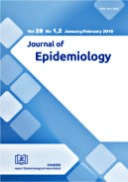
JOURNAL OF EPIDEMIOLOGY
Transforming data into impactful health strategies.JOURNAL OF EPIDEMIOLOGY is a premier peer-reviewed journal published by the JAPAN EPIDEMIOLOGICAL ASSOCIATION dedicated to advancing the field of epidemiology and public health. With an impressive impact factor and recognition as a Q1 journal in both the epidemiology and miscellaneous medicine categories, it ranks in the top percentile of its field, occupying the 28th position out of 148 journals in epidemiology according to Scopus. Since its inception in 1991, this open access journal has provided researchers, practitioners, and students with valuable insights and findings that shape healthcare policies and practices globally. The journal covers a broad range of topics within epidemiology, fostering a multidisciplinary approach to understanding and addressing health challenges. With a commitment to high-quality research and accessibility, the JOURNAL OF EPIDEMIOLOGY plays a crucial role in the dissemination of knowledge and best practices within the public health community.
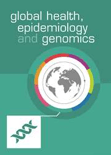
Global Health Epidemiology and Genomics
Connecting epidemiology and genomics for a healthier future.Global Health Epidemiology and Genomics is a prominent open-access journal, published by HINDAWI LTD in the United Kingdom, dedicated to advancing knowledge in the fields of epidemiology and global health. Since its inception in 2016, this journal has become an essential platform for disseminating innovative research findings, covering various aspects related to public health, environmental health, and occupational safety. With a recognized presence in Q3 quartiles of multiple categories, including Epidemiology, Medicine (Miscellaneous), and Public Health, Environmental and Occupational Health as of 2023, it provides a crucial resource for researchers, professionals, and students alike. The journal promotes open access to enhance the global reach and visibility of scholarly work, ensuring that critical health insights are available to a broad audience. By fostering interdisciplinary collaboration and addressing contemporary challenges in health genomics and epidemiology, Global Health Epidemiology and Genomics plays a vital role in shaping public health policies and improving health outcomes worldwide.

Current Epidemiology Reports
Bridging Gaps in Epidemiological UnderstandingCurrent Epidemiology Reports, published by Springer Heidelberg, stands as an essential journal in the field of public health and epidemiology. With its ISSN and E-ISSN of 2196-2995, the journal serves as a dynamic platform for disseminating pioneering research and insightful reviews addressing crucial epidemiological trends and challenges. The journal emphasizes open access to enhance the visibility of groundbreaking studies among a global audience, thereby facilitating collaboration and innovation within the scientific community. Although specific metrics such as the impact factor are currently unreported, its commitment to rigorous peer review ensures that only high-quality research is shared. Defined by its aim to report on infectious diseases, chronic health conditions, and emerging epidemiological phenomena, Current Epidemiology Reports is a vital resource for researchers, healthcare professionals, and students eager to stay abreast of advances in this ever-evolving discipline and contribute to the promotion of public health worldwide.

EPIDEMIOLOGIC REVIEWS
Empowering Researchers with Comprehensive Epidemiological AnalysisEPIDEMIOLOGIC REVIEWS, an esteemed publication from Oxford University Press Inc, stands as a beacon in the fields of Epidemiology and Medicine, with a significant focus on synthesizing and analyzing the latest research and developments in these areas since its inception in 1979. This journal, with its ISSN 0193-936X and E-ISSN 1478-6729, is recognized for its high academic rigor, boasting a 2023 Q1 quartile ranking in both Epidemiology and Miscellaneous Medicine, and ranks #25 out of 148 in Scopus's Epidemiology category, placing it in the prestigious 83rd percentile. Although it does not currently offer open access, its subscription options provide comprehensive access to a wealth of epidemiological knowledge, essential for researchers, public health professionals, and students keen on advancing their understanding of health trends and disease patterns. With a commitment to promoting high-quality research and impactful insights, EPIDEMIOLOGIC REVIEWS plays a crucial role in enhancing public health discourse and shaping future epidemiological inquiries.

Epidemiology and Psychiatric Sciences
Bridging gaps between epidemiology and psychiatric sciences.Epidemiology and Psychiatric Sciences is a leading open-access journal published by Cambridge University Press, dedicated to advancing the fields of epidemiology, psychiatry, and public health. With a strong impact reflected in its Q1 ranking in three critical areas—Epidemiology, Psychiatry and Mental Health, and Public Health, Environmental and Occupational Health—this journal stands at the forefront of interdisciplinary research. Since its inception in 2011, Epidemiology and Psychiatric Sciences has provided a platform for researchers and practitioners to share innovative findings, with the aim of improving mental health outcomes and addressing public health challenges. The journal's commitment to open access, a practice adopted in 2020, ensures that vital research is available to a broader audience, further facilitating knowledge dissemination. Researchers, professionals, and students in these domains will find the journal an invaluable resource in navigating the complex interplay between various factors influencing mental health and well-being.
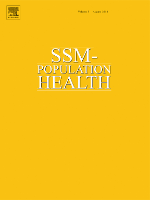
SSM-Population Health
Connecting research with real-world health solutions.SSM-Population Health, published by ELSEVIER SCI LTD, stands as a prestigious platform dedicated to advancing our understanding of population health dynamics. As an Open Access journal since 2015, it fosters a culture of knowledge sharing, allowing researchers, professionals, and students to access high-quality research without barriers. With exceptional rankings in the 2023 category quartiles—Q1 in Health Policy, Health (social science), and Public Health, Environmental and Occupational Health—the journal emphasizes its influential role in shaping public health discourse and policy. Its notable Scopus rankings place it in the top deciles of various health-related fields, underlining its impact on contemporary health issues and research. SSM-Population Health invites contributors to address pressing questions and solutions within the realm of population health, making it a vital resource for those aiming to make an impact in this ever-evolving field.